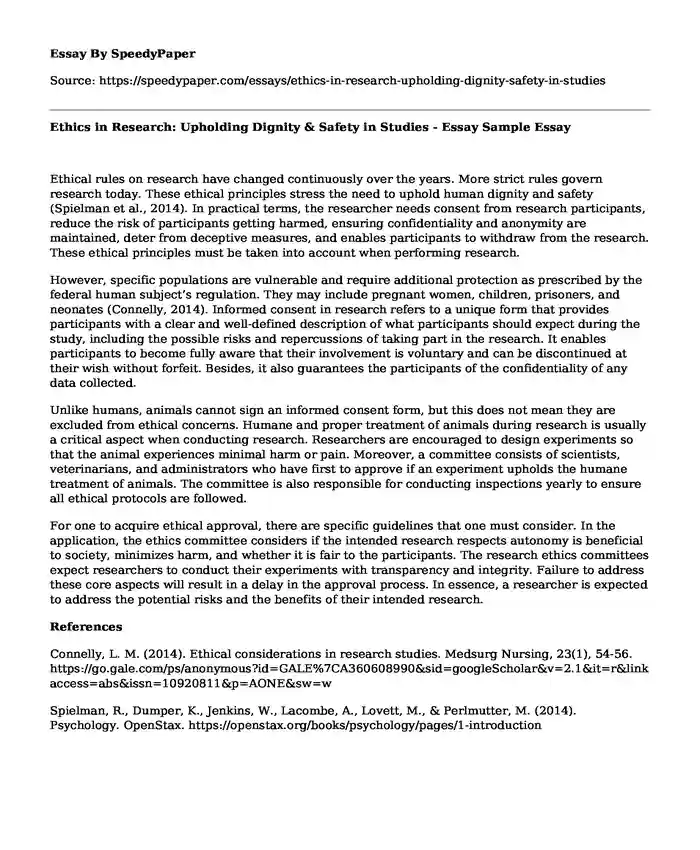Ethical rules on research have changed continuously over the years. More strict rules govern research today. These ethical principles stress the need to uphold human dignity and safety (Spielman et al., 2014). In practical terms, the researcher needs consent from research participants, reduce the risk of participants getting harmed, ensuring confidentiality and anonymity are maintained, deter from deceptive measures, and enables participants to withdraw from the research. These ethical principles must be taken into account when performing research.
However, specific populations are vulnerable and require additional protection as prescribed by the federal human subject’s regulation. They may include pregnant women, children, prisoners, and neonates (Connelly, 2014). Informed consent in research refers to a unique form that provides participants with a clear and well-defined description of what participants should expect during the study, including the possible risks and repercussions of taking part in the research. It enables participants to become fully aware that their involvement is voluntary and can be discontinued at their wish without forfeit. Besides, it also guarantees the participants of the confidentiality of any data collected.
Unlike humans, animals cannot sign an informed consent form, but this does not mean they are excluded from ethical concerns. Humane and proper treatment of animals during research is usually a critical aspect when conducting research. Researchers are encouraged to design experiments so that the animal experiences minimal harm or pain. Moreover, a committee consists of scientists, veterinarians, and administrators who have first to approve if an experiment upholds the humane treatment of animals. The committee is also responsible for conducting inspections yearly to ensure all ethical protocols are followed.
For one to acquire ethical approval, there are specific guidelines that one must consider. In the application, the ethics committee considers if the intended research respects autonomy is beneficial to society, minimizes harm, and whether it is fair to the participants. The research ethics committees expect researchers to conduct their experiments with transparency and integrity. Failure to address these core aspects will result in a delay in the approval process. In essence, a researcher is expected to address the potential risks and the benefits of their intended research.
References
Connelly, L. M. (2014). Ethical considerations in research studies. Medsurg Nursing, 23(1), 54-56. https://go.gale.com/ps/anonymous?id=GALE%7CA360608990&sid=googleScholar&v=2.1&it=r&linkaccess=abs&issn=10920811&p=AONE&sw=w
Spielman, R., Dumper, K., Jenkins, W., Lacombe, A., Lovett, M., & Perlmutter, M. (2014). Psychology. OpenStax. https://openstax.org/books/psychology/pages/1-introduction
Cite this page
Ethics in Research: Upholding Dignity & Safety in Studies - Essay Sample. (2023, Nov 24). Retrieved from https://speedypaper.net/essays/ethics-in-research-upholding-dignity-safety-in-studies
Request Removal
If you are the original author of this essay and no longer wish to have it published on the SpeedyPaper website, please click below to request its removal:
- Essay Sample: Transitional Processes of Adult Day Care Facilities
- Research Paper on Preventing Domestic Violence, Free Essay
- Lois Mailou Jone Research - Art Essay Example
- Essay Sample on Nursing Research and Evidence-based Practice
- Essay Sample: Market Research on Detergents
- Essay Sample on the Relationship Between Nursing Leaders' Emotional Intelligence and Patient Safety
- Free Essay. The Ethics of Anthropology and Archaeology
Popular categories





